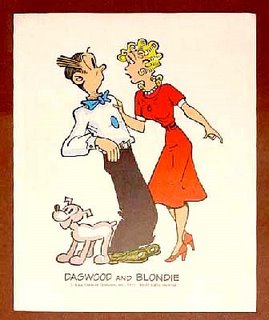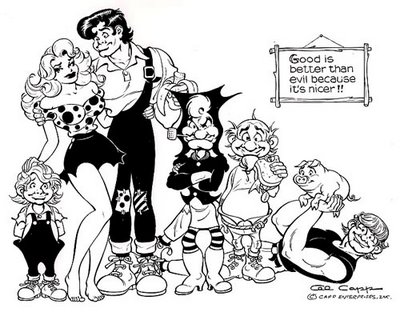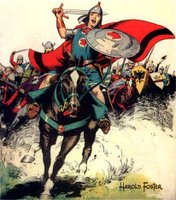Mae's Real Stories
Memories for Miriam, Alice, Theo, Delia, Tessa and anyone else who would like to be hereThursday, September 07, 2006
"Dibs on the funny paper"
 Summer afternoons when we were kids could be very boring. But at around 2 or 3 in the afternoon the paper truck came down the street. The paper man on the truck had little rolling and tieing machine that wrapped a piece of string tightly around each copy of the newspaper. Then the machine tied a knot and cut the string. As soon as a rolled and tied paper was ready, the paper man threw it towards the next front yard along his route. It landed with a thwack, so you could hear the truck coming down the street: thwack, thwack, thwack plus the engine noises.
Summer afternoons when we were kids could be very boring. But at around 2 or 3 in the afternoon the paper truck came down the street. The paper man on the truck had little rolling and tieing machine that wrapped a piece of string tightly around each copy of the newspaper. Then the machine tied a knot and cut the string. As soon as a rolled and tied paper was ready, the paper man threw it towards the next front yard along his route. It landed with a thwack, so you could hear the truck coming down the street: thwack, thwack, thwack plus the engine noises.When we picked up the newspaper we would break the string or untie the knot. Sometimes if I waited for the paper truck in just the right spot, the paper man would throw it to me and I would catch it. Usually, we were sitting on the porch and would get up and run towards the spot where the paper had landed. Whoever picked up the newspaper could be the first one to read the funnies which were printed on the very last page of the last section. If you yelled "dibs on the funny paper" you got to pick up the paper and read the funnies first.
Even when I learned to look at a few of the other stories in the newspaper, I always read the funnies before the news or the book pages or the column "My Day" by Eleanor Roosevelt that my mother liked to read. Imitating my mother, I tried to read this column, but I didn't see why it was interesting. The paper also had an advice column called "Martha Carr" that I didn't find very interesting either. I really liked the cartoons in the funny paper.
The top cartoon on the funny page was "Blondie," about the Bumstead family. Dagwood Bumstead worked in an office for a boss named Mr. Dithers. He liked to make very tall sandwiches full of very funny foods. Even now, if you eat a very complicated sandwich someone might call it a Dagwood sandwich.
 Blondie Bumstead was a housewife. She wore an apron. She would sweep the floor of their house and ask Dagwood to put his feet up in the air so she could sweep next to his chair without making him move out of the way. They had two children named Cookie and Alexander and a dog named Daisy. We thought this cartoon was very funny.
Blondie Bumstead was a housewife. She wore an apron. She would sweep the floor of their house and ask Dagwood to put his feet up in the air so she could sweep next to his chair without making him move out of the way. They had two children named Cookie and Alexander and a dog named Daisy. We thought this cartoon was very funny.The back funny page was colored in red and yellow. Sometimes the colors weren't very clear or very well lined-up with the pictures. Also near the top of the funny page were "Nancy and Sluggo," "Lil Abner," "Pogo," and "Little Ellsworth." Nancy was a nice girl, with an aunt who was very stylish named Aunt Fritzi, but Sluggo was a rough kid. Lil Abner was a hillbilly with a big family, including a brother named "Tiny" who was very tall.

On an inside page, printed only in black and white, were comics that told a story that went on from day to day, like "Rex Morgan, MD" and "Mandrake the Magician." I liked all of these also. Mandrake the Magician had a helper named Lothar. When Mandrake "gestured hypnotically" he made people see things that were not there or he made them miss seeing things that were there. Mandrake and Lothar had adventures and saved people who were in trouble.

On Sundays the funny pages were very long and the color was better. A special Sunday comic was called "Prince Valiant." Some of these comic strips still appear in newspapers, with new episodes written by new cartoonists. Some are long forgotten.

Reading the funny paper made the slow afternoon go by faster, especially when we didn't have any books to read and the weather was hot. Always that hot St. Louis summertime.
Archives
August 2006 September 2006 October 2006 November 2006 December 2006 January 2007 February 2007 March 2007 April 2007 May 2007 June 2007 July 2007 August 2007 September 2007 October 2007 November 2007 December 2007 January 2008 February 2008 March 2008 April 2008 May 2008 June 2008 July 2008 August 2008 September 2008 October 2008 November 2008 December 2008 January 2009 February 2009 March 2009 April 2009 May 2009 June 2009 July 2009 August 2009 September 2009 October 2009 November 2009 December 2009 January 2010 February 2010 March 2010 April 2010 May 2010 June 2010 September 2010 October 2010 November 2010 February 2011 May 2011 September 2011 March 2012 April 2012 May 2012
Subscribe to Comments [Atom]